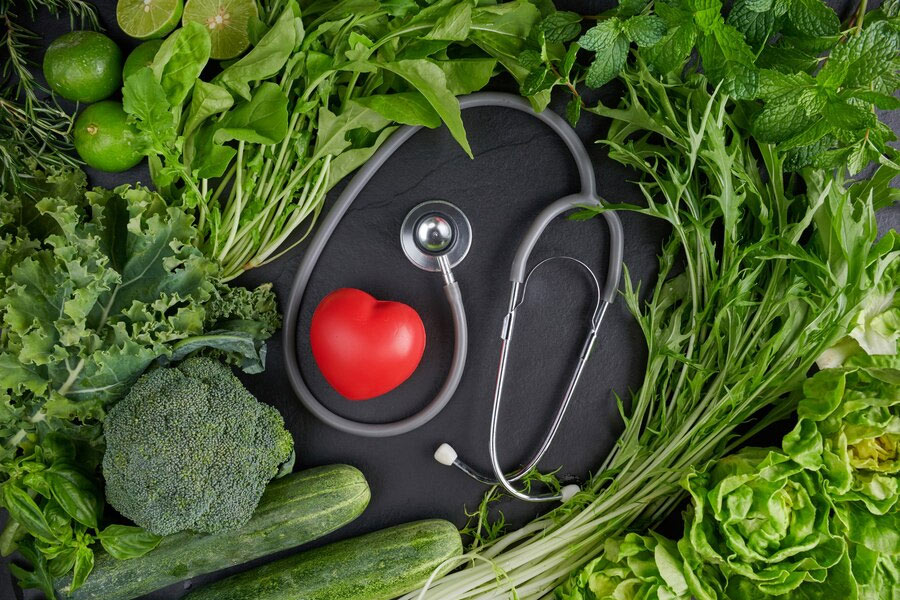
The heart, an unwavering force in the symphony of our bodily functions, confronts diverse challenges daily. Amidst the well-known threat of heart attacks, strokes emerge as formidable adversaries. These life-threatening cardiovascular diseases demand proactive measures for fortification. Fortunately, certain foods emerge as stalwart allies in the battle against strokes and the overall enhancement of heart health. In this discourse, we embark on a journey into dietary adjustments, unravelling the potential of foods to mitigate the risk of strokes.
Table of Content:-
Anti-Blood Clotting Foods That Can Help Prevent Stroke

Green Leafy Vegetables: Nutrient-Rich Powerhouses
Celebrated for their bounty of vitamins, minerals, and antioxidants, green leafy vegetables such as spinach, kale, and collard greens stand as nutritional powerhouses. Infused with dietary nitrates, they play a crucial role in reducing blood pressure and augmenting circulation, significantly diminishing the susceptibility to strokes.
Mixed Berries: Nature's Shield of Antioxidants
The embrace of strawberries, blueberries, and raspberries emerges as a strategic dietary choice in preventing strokes. Laden with antioxidants and anti-inflammatory properties, these berries combat oxidative stress and inflammation, addressing key triggers for strokes. Regular inclusion of berries in the diet becomes a holistic contribution to the overall well-being of the heart.
Also Read: 4 Important Numbers You Should Know For Your Heart Health
Fatty Fish: Guardians of Omega-3 Fortitude
Salmon, mackerel, and sardines, categorized as fatty fish, stand as fortresses of omega-3 fatty acids. These essential fats play a pivotal role in quelling inflammation, preventing clot formation, and fostering comprehensive heart health. Strategically integrating fatty fish into weekly meals becomes a cornerstone in diminishing the risk of strokes.
Whole Grains: Allies in Nutrient Density
Oats, brown rice, and quinoa, representative of whole grains, wield a nutrient-dense influence. Laden with fibre, vitamins, and minerals, they contribute significantly to reducing cholesterol levels, moderating blood pressure, and enhancing blood vessel function—a trifecta crucial in stroke prevention and the promotion of heart health.
Nuts and Seeds: Emissaries of Heart-Friendly Nutrients
Almonds, chia seeds, flaxseeds, and walnuts—these nuts and seeds emerge as ambassadors of heart-friendly fats, fiber, and antioxidants. Their collective impact manages inflammation, lowers cholesterol levels, and enhances blood vessel function. Diversifying the daily diet with these becomes a linchpin in fortifying heart health.
Dark Chocolate: Guilty Pleasure Aligned with Heart Health
Dark chocolate aficionados can revel in the knowledge that their indulgence aligns with heart health. Rich in cocoa, dark chocolate introduces antioxidants and anti-inflammatory properties. The daily incorporation of a piece can significantly bolster blood circulation, mitigate blood pressure, and decrease the risk of strokes.
Also Read: Heart Attack Deaths 40% Up in Under-30 Post Covid
Green Tea: Elixir Enriching Heart Health
For enthusiasts of tea, the transition to green tea unveils a treasure trove of heart-boosting antioxidants and polyphenols. Regular consumption correlates with a reduced risk of strokes and an overall enhancement of heart health. Swapping regular tea for this elixir becomes a wise move to unlock its myriad benefits.
Bottomline
In the pursuit of nurturing heart health, these foods stand not only as bulwarks against heart attacks but also as steadfast allies in optimising bodily functions. While these dietary recommendations bear the hallmark of heart-healthy choices, it remains prudent to seek counsel from healthcare professionals before undertaking significant dietary alterations. The road to stroke prevention and enduring heart health commences with these nutritional allies, but personalized guidance ensures a well-informed and tailored journey.
Also watch this video
How we keep this article up to date:
We work with experts and keep a close eye on the latest in health and wellness. Whenever there is a new research or helpful information, we update our articles with accurate and useful advice.
Current Version